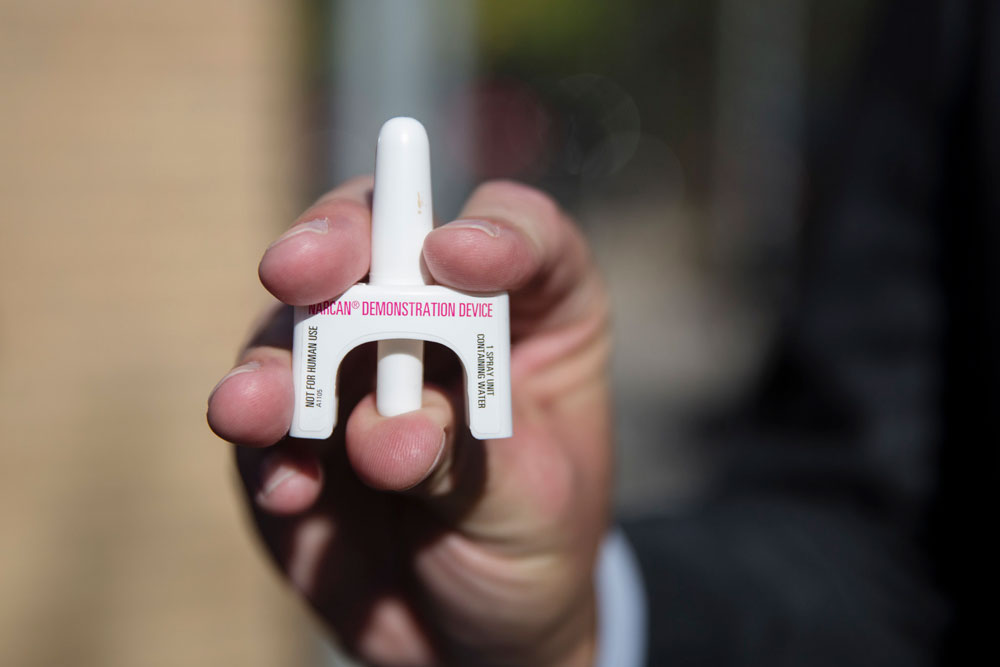
For several years in Flagler County as elsewhere in the county, drug-overdose calls to 911 have been routine, often turning sheriff’s deputies or other law enforcement, who are usually first at overdose scenes, into paramedics. So it was late the night of Dec. 17 on Westridge Lane in Palm Coast, with one difference: in this case, Sheriff Rick Staly was among the responders, and among those who administered the agent used to counter the effects of a drug overdose.
When the woman regained consciousness after repeated efforts from responders, she rejected further care–and was left with a dose of Narcan, the neutralizing agent used to counter overdoses. Authorities have often spoken of treating addicts at scenes, at times the same addict in the same 24-hour period, only to hear them say that as long as they have access to Narcan, they feel secure. Authorities in this case referred to the “Leave at home Narcan program,” essentially turning an expensive and urgent response by law enforcement, firefighter-paramedics and the Department of Children and Families into something like DoorDash for Narcan.
It was Friday night, when the sheriff routinely patrols since he was elected in 2016. The call to 911 came in at 9:05 p.m.: T.E.K., a 31-year-old woman, parent to two children, had been found by her 15-year-old sister “on the couch not breathing and slumped over,” according to 911 notes. T.E.K. had been living at her mother’s Westridge Lane home for the past two weeks.
It wasn’t entirely clear whether it was an overdose. Deputy Jasmine Slaga, who’s been with the agency since last year, was first on scene. “I observed her not breathing and with no pulse with a slightly bluish tint of skin,” Slaga reported. “I guided her body to the floor and Performed CPR,” then a first dose of Narcan, a neutralizing agent administered in various medical situations, including overdoses. Narcan works to restore normal breathing. It had no effect, however. By then the sheriff was on scene, having arrived along with deputy Benjamin Jurec, and administered a second dose.
When firefighter-paramedics arrived (the Palm Coast Fire Department and Flagler County Fire Rescue responded), they administered liquid Narcan and transported T.E.K. to an ambulance, where she became conscious and aware. While she takes certain medications for anxiety, she insisted she had not overdosed, refused further treatment and refused transportation to the hospital. Her mother told authorities that her daughter had had a previous issue with substances. “NO marks were found on her person at this time,” 911 notes state. But it appeared not to have been the first time that she’d required intervention by authorities. There are no indication from 911 notes that any drugs were located at the house. A sheriff’s spokesperson said there was no incident report aside from the 911 notes.
“Patient’s mother signed for ‘leave at home narcan program,'” the 911 notes state: T.E.K. was left with a dose and shown how to use it. The Department of Children and Families was called, and opened an investigation.
“Deputies and rescue teams respond to calls like this multiple times a week,” Sheriff Rick Staly said in a release. “This was a team effort to save her life so she could celebrate another Christmas with her family. Sadly, this is not the first time deputies have responded to an overdose with this victim, and without her wanting to take the steps to get help for her addiction, it probably won’t be the last time. Untreated addiction is like playing Russian roulette with your life and sadly it often does not end well. I commend
our deputies, paramedics, and firefighters that worked as a team to save her life and I pray she accepts help to beat her addiction before it ends in tragedy.”
Under Florida law, an individual caught with illegal substances may be arrested. But an individual overdosing on a substance may not. The difference is intended to ensure that people don’t hesitate, out of fear of being arrested, to call 911 in cases of overdoses.
If you or someone you know needs help with an addiction or substance abuse, SMA Health Care has treatment resources.





























Concerned Paramedic says
I do not understand how this is legal. If a person is known to be under the influence of drugs or alcohol they by law can not give inform consent to refuse medical treatment. This should be a Baker Act or a minimum a Marchman Act. How is it determined that this was not a Suicide attempt instead of an accidentally overdose?